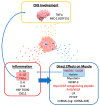Cancer-Associated Muscle Wasting-Candidate Mechanisms and Molecular Pathways
- PMID: 33291708
- PMCID: PMC7729509
- DOI: 10.3390/ijms21239268
Cancer-Associated Muscle Wasting-Candidate Mechanisms and Molecular Pathways
Abstract
Excessive muscle loss is commonly observed in cancer patients and its association with poor prognosis has been well-established. Cancer-associated sarcopenia differs from age-related wasting in that it is not responsive to nutritional intervention and exercise. This is related to its unique pathogenesis, a result of diverse and interconnected mechanisms including inflammation, disordered metabolism, proteolysis and autophagy. There is a growing body of evidence that suggests that the tumor is the driver of muscle wasting by its elaboration of mediators that influence each of these pro-sarcopenic pathways. In this review, evidence for these tumor-derived factors and putative mechanisms for inducing muscle wasting will be reviewed. Potential targets for future research and therapeutic interventions will also be reviewed.
Keywords: cancer; mediators; muscle wasting; pathophysiology; sarcopenia; tumor; tumor-derived.
Conflict of interest statement
O.F.B. has received funding from Pfizer Inc. for research on cachexia.
Figures
Similar articles
-
Metabolic and Molecular Basis of Sarcopenia: Implications in the Management of Urothelial Carcinoma.Int J Mol Sci. 2019 Feb 11;20(3):760. doi: 10.3390/ijms20030760. Int J Mol Sci. 2019. PMID: 30754663 Free PMC article. Review.
-
Catabolic signaling and muscle wasting after acute ischemic stroke in mice: indication for a stroke-specific sarcopenia.Stroke. 2014 Dec;45(12):3675-83. doi: 10.1161/STROKEAHA.114.006258. Epub 2014 Oct 28. Stroke. 2014. PMID: 25352483
-
Ovarian cancer ascites induces skeletal muscle wasting in vitro and reflects sarcopenia in patients.J Cachexia Sarcopenia Muscle. 2022 Feb;13(1):311-324. doi: 10.1002/jcsm.12885. Epub 2021 Dec 23. J Cachexia Sarcopenia Muscle. 2022. PMID: 34951138 Free PMC article.
-
Cachexia and sarcopenia: mechanisms and potential targets for intervention.Curr Opin Pharmacol. 2015 Jun;22:100-6. doi: 10.1016/j.coph.2015.04.003. Epub 2015 May 14. Curr Opin Pharmacol. 2015. PMID: 25974750 Review.
-
Molecular mechanism of sarcopenia and cachexia: recent research advances.Pflugers Arch. 2017 Jun;469(5-6):573-591. doi: 10.1007/s00424-016-1933-3. Epub 2017 Jan 19. Pflugers Arch. 2017. PMID: 28101649 Review.
Cited by
-
Muscle loss in cancer cachexia: what is the basis for nutritional support?Front Pharmacol. 2025 Feb 26;16:1519278. doi: 10.3389/fphar.2025.1519278. eCollection 2025. Front Pharmacol. 2025. PMID: 40078277 Free PMC article. Review.
-
Does Human Papillomavirus Infection Influence the Frequency and Severity of Nutritional Disorders in Head and Neck Cancer?Nutrients. 2022 Oct 27;14(21):4528. doi: 10.3390/nu14214528. Nutrients. 2022. PMID: 36364788 Free PMC article. Review.
-
Tumor-Derived Sarcopenia Factors Are Diverse in Different Tumor Types: A Pan-Cancer Analysis.Biomedicines. 2024 Jan 31;12(2):329. doi: 10.3390/biomedicines12020329. Biomedicines. 2024. PMID: 38397931 Free PMC article.
-
Does the Interaction between Local and Systemic Inflammation Provide a Link from Psychology and Lifestyle to Tissue Health in Musculoskeletal Conditions?Int J Mol Sci. 2021 Jul 7;22(14):7299. doi: 10.3390/ijms22147299. Int J Mol Sci. 2021. PMID: 34298917 Free PMC article. Review.
-
Machine learning-random forest model was used to construct gene signature associated with cuproptosis to predict the prognosis of gastric cancer.Sci Rep. 2025 Feb 4;15(1):4170. doi: 10.1038/s41598-025-88812-9. Sci Rep. 2025. PMID: 39905263 Free PMC article.
References
-
- Prado C.M.M., Lieffers J.R., McCargar L.J., Reiman T., Sawyer M.B., Martin L., Baracos V.E. Prevalence and clinical implications of sarcopenic obesity in patients with solid tumours of the respiratory and gastrointestinal tracts: A population-based study. Lancet Oncol. 2008;9:629–635. doi: 10.1016/S1470-2045(08)70153-0. - DOI - PubMed
-
- Vagnildhaug O.M., Balstad T.R., Almberg S.S., Brunelli C., Knudsen A.K., Kaasa S., Thronaes M., Laird B., Solheim T.S. A cross-sectional study examining the prevalence of cachexia and areas of unmet need in patients with cancer. Support. Care Cancer. 2017;26:1871–1880. doi: 10.1007/s00520-017-4022-z. - DOI - PubMed
Publication types
MeSH terms
Substances
Grants and funding
LinkOut - more resources
Full Text Sources
Medical



